12 Days of Ed Wood, Night 8
Like everyone, I have a soft spot for old crappy, stock footage-jammed jungle movies from the 30s-40s (and sometimes 50s) but---as befitting the times--with a caravan of caveats: no children (that means you, "Boy"); no caged animals; no wasting time with excessive frolicking chimps (especially ones confusingly named "Cheetah"); no prey-favoritism (i.e. "Boy" rescuing antelopes from starving leopards); and above all no race-favoritism (Jane making Tarzan protect obviously bad white guys from indignant natives and/or disgruntled animals). I also dislike when a film wastes too much time on montages indicating a long boring trek through jungle heat, and arguments with suspicious native porters. Oh and I hate the ones filmed in color, unless the color is really well restored. I'm also not a big fan of Johnny Weismuller, truth be told and that dumbstruck blankness I see in his eyes. So what's left?
Plenty, as it turns out, I love white women living as savage goddesses; the meta-clever practice of mixing new actor footage with older jungle stock footage; crocodiles (with alligators discreetly thrown in), real snakes and rubber snakes dangling limply from threes; witch doctors wearing goofy Egyptian-style hats, and cool native idols with jewels in the center of their foreheads...
And guys in gorilla suits!
(PS - The reviews below all contain Spoilers, unusual for me, must be all the Forgotten Horrors volumes I've been reading lately. )
First thing that strikes me with the potted frond PRC jungle "thriller" Nabonga is the quiet. There's almost no music at all, just diegetic jungle sounds ever present but low in the mix like white noise: distant howls of gorillas and lions, the calls of birds, the chattering of bats (?) stay a constant but sound far-off, as if we're safe in the cool of the reptile house during a hot trip to the zoo. Maybe that's the reason I'm such a fan of this terrible movie? I taped a truncated version long ago as a kid in the very early-80s, off a PBS show called Matinee at the Bijou, so maybe I'm biased. My brother and I watched it every night for months.
The story opens with a small plan caught in a storm over the Congo: an embezzler, the loot, his young daughter. It's going down! Hold on, dear! You can guess the rest. They crash. Little Doreen nurses a wounded gorilla back to health and it becomes her protector after her father dies. The girl will grow up to be Julie London. Samson (Ray "Crash" Corrigan) the gorilla, will make sure his stolen jewel fortune stays hers (not that it will do her any good out in the thick of nowhere) and that Samson kills anyone who comes looking for it. Or gets fresh, one presumes.
Flash forward ten years or so; there are tales of the "white witch" who lives in a "house with wings" in the interior, a rumor which will catch the ear of the Gorman (Buster Crabbe) the grown son of the disgraced financier who was accused of embezzling the funds taken by Doreen's dad. He's there to clear dad's name and the funds will do that, but a beady-eyed crook Carl (Barton MacLane) and his shady French partner Mimi (Fifi D'Orsay - right) overhear and follow along. Much skulking and fighting, shooting at dangerous animal stock footage, pointing at playful animal stock footage, and wrestling with rubber gators, ensues. Meanwhile, sweet Doreen clad in a sarong (made from the airplane's curtains), absently eats an apple, sweeps the dirt, plays with a monkey, and puts parrots on branches, as Samson protects her from passing predators. These two are destined to meet. And Samson will make for a pretty brusque chaperone. In short, sublime soundstage jungle thrills ahoy!The only debit for me personally is that the soundstage clearly needed air conditioning -- most everyone is glazed over in sweat most of the time, especially shirtless Togo, the native guide Gorman rescues from various fates; Mimi is the second worst, dripping under her pith helmet, soaking through her mom-style safari shorts and dragging a clunky holster. (I'm not a big fan of high dew point movies). Luckily, for a breezy contrast, we have Doreen. With just a sarong and a flower in her hair, she's as if to the manor born. And yet, once they meet, Gorman doesn't even want to sleep with her. Even if Samson weren't listening right outside, fixing to bounce Gorman around the set the minute he lays a finger on her, Gorman's natural censor-mandated shyness would keep him pure. So Doreen fumes just like little Carmen in The Big Sleep, only with less thumb-biting. Something's got to give! The evil Mimi and Barton are closing in!
Sitting around next to each other on some jungle rock, Gorman mansplaining concepts of right and wrong while Doreen looks right through him, these two young low-key actors convey an almost Lake-Ladd Glass Key chemistry. I love that she brushes off his manly ultimatums without even getting mad. With her pleasingly nasal rasp voice and sleepy-eyed 'Carol Lombard on half-quaalude' delivery is appealing. Lines like "Father always wanted Samson to kill people," are tossed off as if shrugs, chilling the blood slightly, in a good way against the high dew point. She may be just getting started in the world of men, but she's already cooler than at least one! Her future as the world weary chanteuse who will one day make "Cry Me a River" a ubiquitous anthem of hipster disaffect is assured. "It's only a thimbleful of a voice, and I have to use it close to the microphone," she said of her singing, "But it is a kind of oversmoked voice, and it automatically sounds intimate." It's true even here, inside a soundstage cave, at 18 , with a giant gorilla listening in.It's this rightness that trips him up over and over. Marie survives and then convinces Gorman to trap Samson in a cage to free up "his" access to the jewels. Of course Carl is waiting in the wings and it all leads to double crosses and a long fistfight. Carl lives just long enough to conveniently plug the poor ape a bunch of times, before getting what looks like his arm ripped off (the details of the rending are partially obscured by the flora), leaving everyone in the cast safely dead but our handsome low-key couple, now free of impediments (i.e. Doreen has lost her old protector so is no longer safe from the blessings of civilization.) It's a pretty tidy resolution (wasn't Gorman supposed to be shot?) but what are you going to do to in a film that runs naught but a tidy Newfield-hour? There's not even time for a kiss at the end. The final close-up of the pair is spent mourning the mighty Samson while Gorman assures her going home with him to New York or wherever and giving up her only source of wealth means she's destined to be very happy. The low ebb of 'green noise' in the background, animal roaring and shrieking, seem to be saying goodbye, like being pulled out of a comfortable prehistoric sleep by a 20th century alarm clock.
Uh huh.
PS- when I did a search for "Nabonga" on Definitons.net. The top result asked: "Did you actually mean napping or numbness?"
The reptile house strikes again.
The most important thing to remember about Bowanga, Bowanga (aka Wild Women), a tale of male explorers finding an all-white female tribe in "Africa," is that it is not Wild Women of Wongo (1959) nor Prehistoric Women (1950) nor the 1952 Untamed Women (though Untamed Women is another title Bowanga sometimes goes by). Those three (lesser) films are marred by an irritatingly smug aura of 50s male entitlement and 'patriarchy restored!' cop-out endings. Unlike them, Bowanga is genuinely subversive, a refreshing saga of reverse sexism that plays it more or less dead straight. A better title would have been "the White Sirens of Africa," which is how these women are referred to (or 'The Ulama' by the frightened natives). As far as I know Bowanga Bowanga is a meaningless phrase unless it has some dirty connotation to the 50s raincoat crowd dreamt up by a lazy promoter. But whaddaya gonna do?
There are some amazon movies where you can feel the resentment and seething distrust emanating from the half-naked girls towards the camera, hampering the idea that they are a strong bunch of Amazons. This is perhaps a result of some groping director or verbally abusive producer making the shoot a chore, eager to put the women in 'their place' lest the powerful women they play give them the 'wrong' ideas. But then there are movies where the filmmakers seem to genuinely love strong women, and the actresses playing them seem to be having a grand time, neither taking it so seriously it becomes a downer (like the 1967 Prehistoric Women) nor playing it so broadly it becomes camp the (i.e, the 1950 Prehistoric Women). The girls in Bowanga do it just right, playing it in a deadpan cool Switchblade Sisters kind of way, i.e. in on the joke but still badass.
Sadly, that gorilla suit is never seen again.
Anyway it's all over too soon to get mad, climaxing with a chase along the beach and a sudden use for the fireworks Sparafucile mentioned at the beginning (foreshadowing!). As the tribe begrudgingly salutes farewell from the cliffs, the three white men and the girl who helped them escape link arms, singing, and skipping into the sunset like they're headed off to see the wizard or dub Lina Lamont.
Nobody is oppressing nobody. That is a miracle.
---
The 7'2" giant known as Richard Kiehl (the iconic 'Jaws' in The Spy who Loved Me) finds a great early role as a giant prehistoric man still living out in a forgotten desert cavern near Palm Springs. An anthropology professor (Hall Sr.) on vacation with his foxy daughter, Roxy (Marilyn Manning), wind up in the big man's cave, forced to deal with his strange hormonal urges. Her towheaded, apple-cheeked, gas jockey crooner boyfriend Tom (Arch Hall Jr) tools through the terrain in his snazzy dune buggy trying to find them. You can't get more early-60s regional California drive-in schlocky if you tried. Pitched somewhere between a goofy (but deadpan) comedy ala AIP's beach movies, and sci-fi/horror, there's doomed one-sided romance, fish-out-of-water comedy, dune buggy bragging, guitar crooning (Hall made this and other films to showcase his musician son), and an anthropological sexy nightmare.
Events kick into overdrive when dad doesn't show up to meet them at the country club after his jaunt out into nowhere on the odd chance a caveman liveth. Roxy and Tom eat up some time tooling through the desert sand in his ginchy yellow dune buggy. We learn Tom puts water into his tires so they get better traction in sand. Cool tip! What he's not good at, we can glean from Roxy's frustration with him, is "sealing the deal." She's a vacationing daughter of an academic, he's a scroungy gas station attendant with a guitar. That her dad even stands him is fairly astounding. Maybe he can tell there's not much to worry about--the couple spend the (day-for) 'night' around a (never seen) 'fire' after an unsuccessful day searching, the only relief from their strained lack of romantic spark comes from one of his not-bad Donny and Joe Emerson-esque sad-sweet song about some other girl, named Valerie. The song is OK, but it doesn't necessarily have the desired effect on her he intended. Before Hall can awake the next day, Roxy has been literally swept off her feet by lusty Eegah, who brings her back to his cave boudoir, luckily dad is already there, lying helpless with a broken collarbone, trying to establish basic communications (he's learned the giant's name is "Eeegah")
Unlike most hormonal monsters, Eegah is not necessarily bad nor is he good; he's merely a giant savage with no social conditioning and no outlet for his bristling hormonal urges (being all alone in his Bronson cave for way too long). So we spend quite a bit of time in that cave, watching, our jaws agape, as Roxy tries to keep Eegah distracted while immobilized dad shouts encouragement: "Keep his mind on something else!"
Hall Sr. really comes into his own as an actor in this stretch of the film, alternately flippant and consoling, with a nasal but resonant voice that evokes a slightly drunker Lyle Talbot (if such a thing is possible). It's also pretty clear he dubs Eegah's low end Popeye-esque muttering (which gives the two of them a kind of unspoken link, as if Eegah is some unconscious incestuous projection of his id, ala Forbidden Planet). To keep Eegah occupied, Roxy shaves off his beard (symbolism!), while singing "Whiskers." She makes eating, drinking, and sleeping pantomimes, and is introduced to the mummified heads of Eegah's ancestors Eventually, all out of distractions, the romantic music surges up as Eegah starts tearing off her clothes. Meanwhile dad can only yell: "Don't upset him!"
Thus Eegah is succinct and potent in conveying the dangers of being a hormonal male who has not learnt restraint prior to the introduction of a sexy babe. All we men have to learn to reign in our desires, lest we become sexual predators before we can even graduate middle school. What makes it all the weirder is the uniqueness in the monster annals of this sort of scene, and the way it's set off against Tom's own overly shy lack of move-busting. Alas, Eegah is just too big for his uncivilized nature not to be a direct threat to civilization, like an infant with the power to destroy buildings when he doesn't get his own way, and virgin or not, sex with a giant would probably be kind of a chore for a 'teenager' of Roxy's small stature, though part of her is still responding (that big shaven Kiehl jaw works its magic) -anyway he's sexier than the Creature from the Black Lagoon, depending on who you ask.
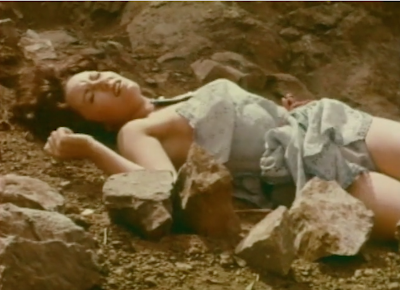 |
| Manning, bringing out the beast |
Meanwhile, every time we cut from the cave and Roxy's nervous distraction tactics to the blazing sun with ineffectual Tom waving his widdle wifle around and yelling her name, a blare of ominous music plays up, as if he's losing his mind. Fans of his sneering psycho in The Sadist will wince at the thought Hall Jr. too may have lapsed back into savagery. I haven't seen The Sadist myself but I hear he's amazingly creepy, and watching Eegah! I believe it. With his pouffy hair and 'Michael J. Pollard hit by a shovel' face there's something about him where you would probably feel both relieved and terrified if he was dating your daughter. He seems psycho on the edges but dependable and respectful in the center, and in the best scene in the film, he rescues Roxy and her father, while Eegah chases the dune buggy, nearly grabbing onto the back seat several times, throwing boulders when the buggy gets far enough away down the cliff, all filmed from the backseat of the buggy to create a very realistic and scary stretch we'd see later aped in films like The Terminator. Good job, Mr. Merriwether!
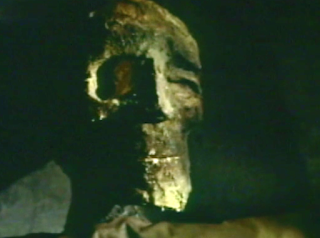 |
| one of Eegah's relatives. "Say hello, Roxy." |
Despite being a reliably goofy kick, Eeagah! also offers some real speculative insight about the existence of a race of giants in the antediluvian era (i.e. Goliath, Gilgamesh, Genesis, 6.4) Is Sasquatch just one of the old giants of old, the Nephilim, one who avoided the flood by staying in a high up cave, and who didn't sit still for a shave from the Roxy of modern civilization? (1)
After her escape, Eegah, like Lobo with that angora sweater in Bride of the Monster, is left with a piece of Roxy's perfumed cloth to haunt him as he recovers from Tom's bullets. He even puts the cloth under the nose of his ancestral heads so they can smell her eligibility to join the family! Finally, lovestruck and hormonally locked-in, poor Eegah takes a drink from his sulphur spring (perhaps the key to his longevity) and then heads down the mountain, easily tracking her to the Palm Springs hotel lodge, where she and the rest of the cast seem to spend all their free time. Out back by the pool, Tom is playing with his band, singing a slightly more upbeat song with yet another girl's name in the title ("Vicky"). Roxy doesn't even notice him. She's missing Eegah ("I just know something's happened to him"). Dad, arm in a sling, smiles and says she's just like her late mother. Dad watches the kids dance and doesn't get it ("it looks like fighting").
Soon enough, it will be. Eegah is smashing his way through the restaurant, headed towards the country club pool, and he ain't no member.
In case you can't tell I kind of love this movie. It's worth watching just to see giant Eegah beating up on Hall, throwing people like assistant director Ray Dennis Steckler (there with his wife/star/muse Carolyn Brandt as extras) into the deep end, then ripping out the ladder, waving it over his head to smash on the gathered cops. Ah, it does the heart good. Eegah may not know how turn door knobs, or what the door sign that says "Ladies" means. But that's okay, Eegah! Girls love a big dumb savage, especially, like Samson in Nabonga, once they're safely dead so can be mourned rather than feared. Tom, you better step up your game! Dearly departed virile giant ape monsters done laid down the gauntlet!
NOTES:
1. I was told by a spirit guide that the reason for the flood was that the watchers wanted to expunge the giants from the earth, but that some of them survived, those high in the mountains where the waters did not reach. Hiding for centuries, they're immortal and able to move in and out of other dimensions to escape detection (the 'Watchers' turned off that feature in our DNA so we wouldn't be able to escape our time/space confines and be able to track them back to Mt. Olympus/Valhalla/Heaven, whatever, and try to usurp them) which is why we've never caught one or found a body. Already wild and untamable, the aeons have seen the giants revert back to precambrian savagery but they are still more advanced than us, due to more 'activated' watcher DNA than we're allowed. Make of that what you will, Arch Hall Jr.!


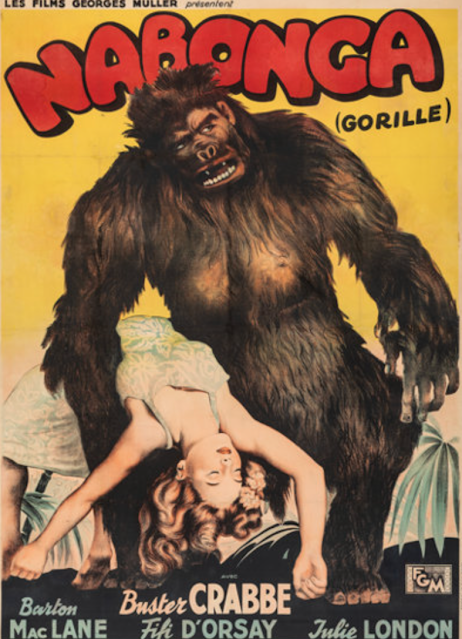


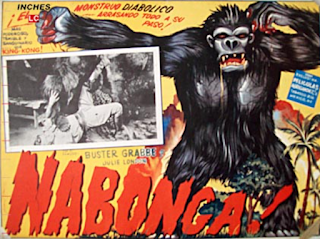

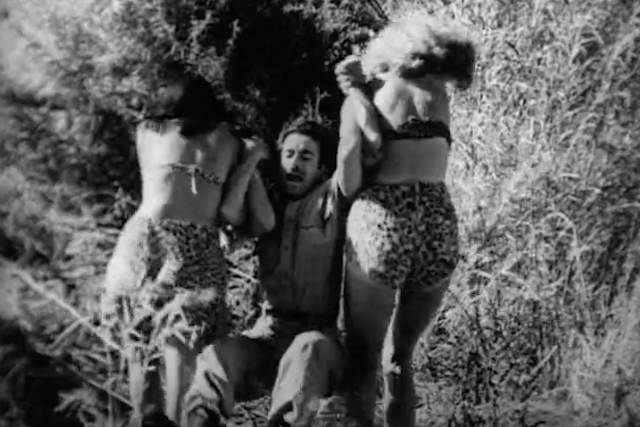



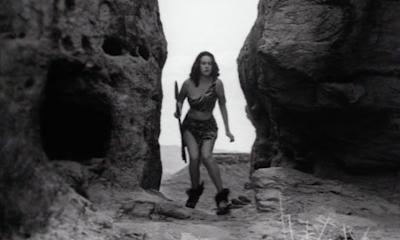
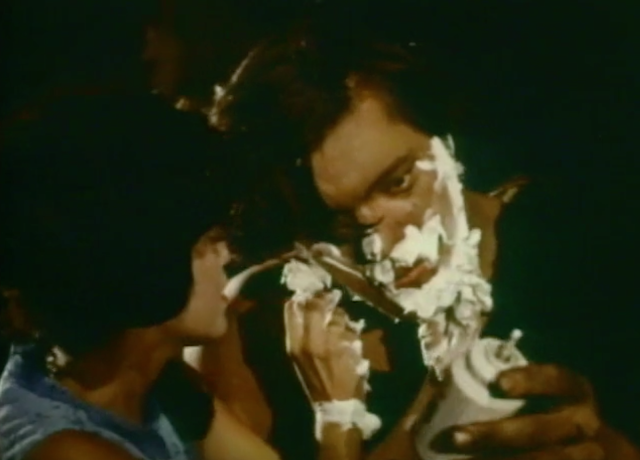
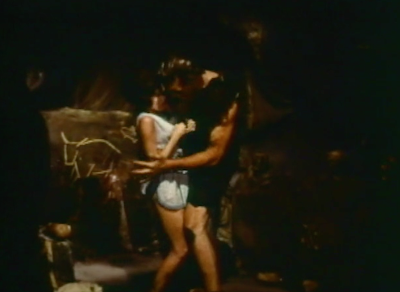
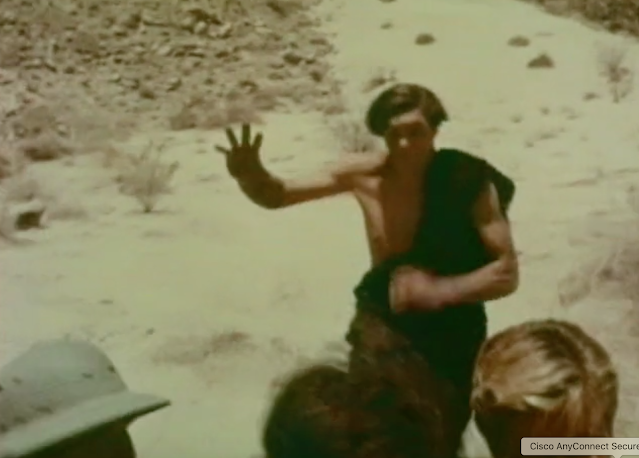
No comments:
Post a Comment